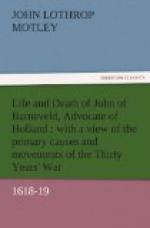When the keys of Flushing, one of the cautionary towns, were committed to the Ambassador, he confided them to the care of Brewster, who slept with them under his pillow. The gold chain which Davison received as a present from the provincial government on leaving the country was likewise placed in his keeping, with orders to wear it around his neck until they should appear before the Queen. To a youth of ease and affluence, familiar with ambassadors and statesmen and not unknown at courts, had succeeded a mature age of obscurity, deep study, and poverty. No human creature would have heard of him had his career ended with his official life. Two centuries and a half have passed away and the name of the outlawed Puritan of Scrooby and Leyden is still familiar to millions of the English race.
All these Englishmen were not poor. Many of them occupied houses of fair value, and were admitted to the freedom of the city. The pastor with three of his congregation lived in a comfortable mansion, which they had purchased for the considerable sum of 8000 florins, and on the garden of which they subsequently erected twenty-one lesser tenements for the use of the poorer brethren.
Mr. Robinson was himself chosen a member of the famous university and admitted to its privileges. During his long residence in Leyden, besides the daily care of his congregation, spiritual and temporal, he wrote many learned works.
Thus the little community, which grew gradually larger by emigration from England, passed many years of tranquillity. Their footsteps were not dogged by constables and pursuivants, they were not dragged daily before the magistrates, they were not thrown into the town jails, they were not hunted from place to place with bows and bills and mounted musketeers. They gave offence to none, and were respected by all. “Such was their singleheartedness and sincere affection one towards another,” says their historian and magistrate, “that they came as near the primitive pattern of the first churches as any other church of these later times has done, according to their rank and quality.”
Here certainly were English Puritans more competent than any men else in the world to judge if it were a slander upon the English government to identify them with Dutch Puritans. Did they sympathize with the party in Holland which the King, who had so scourged and trampled upon themselves in England, was so anxious to crush, the hated Arminians? Did they abhor the Contra-Remonstrants whom James and his ambassador Carleton doted upon and whom Barneveld called “Double Puritans” and “Flanderizers?”
Their pastor may answer for himself and his brethren.
“We profess before God and men,” said Robinson in his Apologia, “that we agree so entirely with the Reformed Dutch Churches in the matter of religion as to be ready to subscribe to all and each of their articles exactly as they are set forth in the Netherland Confession. We acknowledge those Reformed Churches as true and genuine, we profess and cultivate communion with them as much as in us lies. Those of us who understand the Dutch language attend public worship under their pastors. We administer the Holy Supper to such of their members as, known to us, appear at our meetings.” This was the position of the Puritans. Absolute, unqualified accordance with the Contra-Remonstrants.




